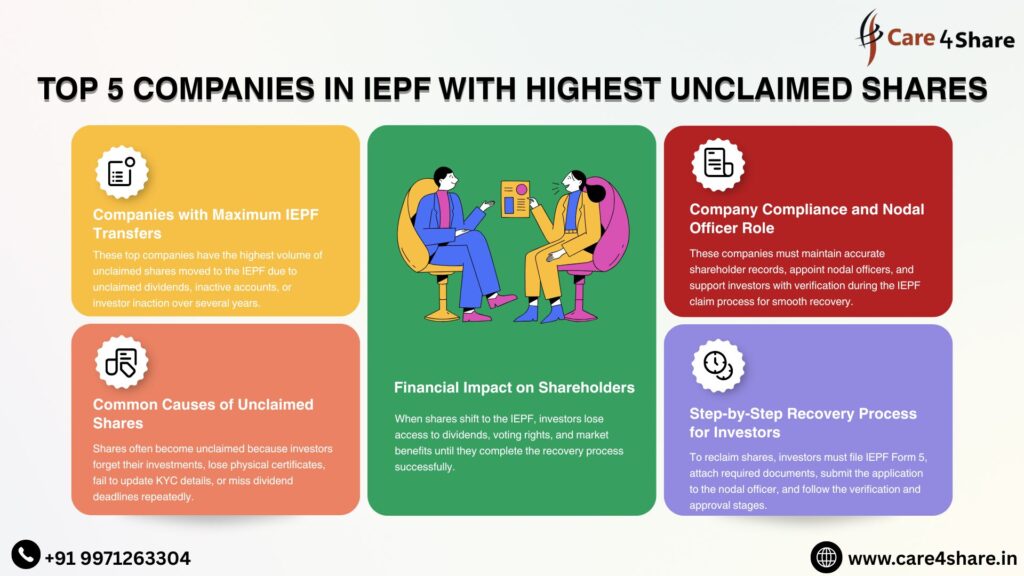INTRODUCTION
Unclaimed shares in India have been rising at an alarming rate. Millions of investors are unaware that their forgotten, misplaced, or inherited shares have been transferred to the Investor Education and Protection Fund (IEPF). While this protects investors’ rights, it also creates a massive pile of unclaimed wealth locked under IEPF until the rightful owner reclaims it.
Among thousands of listed companies, certain large-cap companies contribute significantly to this pool due to their huge shareholder base and long corporate history. In this detailed blog, Care4Share brings you the Top 5 companies in IEPF with the highest unclaimed shares — and why every investor should check if they are a beneficiary.
Understanding IEPF and How Shares Get Transferred
Before we discuss the top 5 companies in IEPF, it’s important to understand why shares end up there.
According to the Companies Act, 2013:
If a shareholder doesn’t claim dividends for 7 consecutive years,
The unpaid dividend AND the related shares are transferred to IEPF.
These shares remain with IEPF until the shareholder or heir claims them.
This means even if you purchased shares years ago — but failed to update your bank account, demat details, or address — your shares could have silently moved into the IEPF account.
Why do shares go unclaimed?
Common reasons include:
Change in residence without updating KYC
Physical share certificates misplaced
Investor passed away, and family was unaware
Dividend cheques returned or never encashed
Shares held long ago in companies that went through mergers, splits, and restructurings
Lack of awareness about the 7-year rule
With India’s growing investor population, these issues have multiplied, creating a large pool of unclaimed wealth.
Top 5 Companies in IEPF with Highest Unclaimed Shares

Below are the top companies that contribute significantly to unclaimed shares within the IEPF system. These companies have large shareholder bases, multi-decade histories, and have gone through many corporate changes leading to high volumes of unclaimed assets.
1. Reliance Industries Limited (RIL)
Reliance Industries consistently appears as the company with the highest unclaimed shares and dividends transferred to IEPF.
Why so many unclaimed shares?
RIL is India’s biggest company by market capitalization
Huge shareholder base since the 1980s
Multiple bonus issues, splits, and corporate restructuring
Shareholders holding physical certificates from older decades
Dividend cheques bouncing due to outdated bank accounts
Today, a massive number of Reliance shares remain unclaimed because older investors didn’t convert their physical shares to demat or failed to keep their details updated.
Who is most affected?
NRIs who moved abroad
Older investors who held certificates in paper form
Families of deceased shareholders
If you or your family ever held RIL shares, there is a significant chance your holdings may be sitting under IEPF. Reclaiming them is often well worth the effort due to RIL’s strong share price appreciation.
2. HDFC Bank Limited
- Unclaimed Assets Held by IEPF
HDFC Bank has one of the largest retail investor bases in the Indian financial sector. Due to its long operational history and consistent dividends, large volumes of unclaimed dividends and shares are transferred to IEPF every year.
Reasons for high unclaimed shares:
Many investors held shares before the HDFC–HDFC Bank merger
People with older demat accounts that became inactive
Unclaimed dividends due to bank account changes
Multiple corporate actions over decades
Lack of awareness among senior citizens
HDFC Bank’s popularity among long-term investors also means many families may unknowingly hold claims on shares transferred to IEPF.
- Claim Procedure
- HUL provides explicit guidance for investors:
- Visit HUL’s “Unclaimed and Unpaid Dividend” webpage for details as of March 31, 2024 Unilever.
- File IEPF-5 using IEPF’s online system.
- Communicate with HUL’s nodal officers:
- Mr. Dev Bajpai (Nodal Officer) – levercare.shareholder@unilever.com
- Claimants should ensure their PAN and KYC are updated through a secure mobile/app process required for IEPF-5.
3. Hindustan Unilever Limited (HUL)
HUL is one of the oldest FMCG companies in India, with shareholders dating back more than 50 years. That long history also results in a large chunk of unclaimed shares.
Reasons behind large unclaimed value:
Many shares bought in the 1970s–1990s were held physically
Dividend cheques returned due to outdated addresses
Shareholders passed away and families were unaware
Demat conversion was never done for older holdings
HUL’s massive share price rise over the decades means even a small unclaimed holding could be worth lakhs today. This makes it extremely important for families to check for ancestral holdings.
4. JSW Steel Limited
JSW Steel frequently appears among companies with high unclaimed corporate benefits. The company regularly updates its shareholders’ unclaimed dividend and IEPF transfer lists.
Key factors contributing to unclaimed shares:
Physical share certificates not converted to demat
Investors unaware of multiple bonus issues over the years
Dividends not claimed within the time limit
Older shareholders who shifted cities/states
Steel companies historically had high retail participation, and many older investors have lost track of their holdings. JSW Steel is a prime example of this trend.
5. ITC Limited
ITC has millions of shareholders and decades of consistent dividend payments. This makes it another company with significant unclaimed shares locked under IEPF.
Why ITC has a high number of unclaimed shares:
Very old shareholdings from earlier generations
Paper certificates issued before digitization
Investors unaware of yearly dividends
Corporate actions and stock splits confusing retail holders
Because ITC shares have appreciated significantly, unclaimed holdings are now extremely valuable. Many families discover lost ITC shares only when they check IEPF records.
Why You Should Check if Your Shares Are in IEPF
The combined value of unclaimed shares and dividends in India is enormous — running into tens of thousands of crores.
Your shares may be in IEPF if:
You moved houses and didn’t update address
Your bank account changed
You forgot older investments
You inherited shares
You have old share certificates
You held shares in physical form and never dematerialized them
Even if you invested small amounts years ago, the value today could be substantial.
How to Check if Your Shares Are in IEPF
Here is a simple process you can follow:
Step 1: Visit the IEPF website
Search using your name, PAN, folio number, or company name.
Step 2: Check the company’s “Unclaimed Dividend” list
Every listed company uploads yearly statements of unclaimed dividends.
Step 3: Verify if your shares were transferred
If dividends remained unclaimed for 7 years, your shares would have been transferred.
Step 4: File IEPF Claim (Form IEPF-5)
Submit the claim online and send required documents to the company’s nodal officer.
Step 5: Track claim status
The IEPF processes claims, but it can take 6–12 months depending on documentation.
Why Reclaiming Shares Through IEPF Is Difficult Without Guidance
Many investors find the process overwhelming because it involves:
Old folios
Missing documents
Legal heir certificates
Transmission procedures
Signature mismatch
Physical certificates
Deceased shareholder cases
Multiple company mergers
Time-consuming documentation
That’s where professional assistance becomes extremely important.
Care4Share: Your Partner in Reclaiming IEPF Shares
At Care4Share, we specialize in helping investors and families:
Recover unclaimed shares & dividends
Claim inherited shares
Resolve name/date mismatches
Handle transmission of shares
Track lost or physical certificates
Liaise with companies and registrars
File and finalize IEPF claims
Our goal is to eliminate the stress and ensure your rightful assets return safely to you.
Final Thoughts
Unclaimed shares are a hidden treasure many families don’t even know they possess. The Top 5 companies in IEPF — Reliance, HDFC Bank, HUL, JSW Steel and ITC — have lakhs of shareholders whose investments are lying idle.
If you ever invested in these companies, or think a family member may have, it’s crucial to check and reclaim what is rightfully yours.
With the right guidance and correct documentation, reclaiming IEPF shares is completely possible — and often life-changing.
If you need help, Care4Share is here to assist you at every step.

